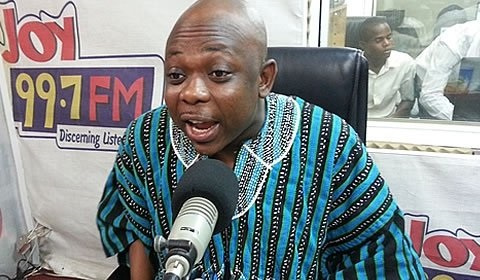Builsa North MP James Agalga is dismayed by the ruling of the Supreme Court on whether a Deputy Speaker of Parliament can vote and form part of the quorum while presiding.
In an interview with JoyNews' Parliamentary Correspondent, Kwesi Parker-Wilson, on Wednesday, the NDC lawmaker said based on his understanding of the relevant provisions, he disagreed with the verdict of the apex court.
According to him, the First and Second Deputy Speakers' role comes with some privileges and responsibilities, which may require a Deputy Speaker to lose his rights as a people's representative while acting in the stead of the Speaker.
"I am indeed shocked and surprised because I thought that for purposes of fairness, persons who assume the chair under normal circumstances should not be part of the decision making process because you sit there as an umpire. And if you assume the role of an umpire, why should you be allowed to vote?
"Never mind that the First and Second Deputy Speakers are Members of Parliament. They represent their people, but they have assumed an additional responsibility. And so whenever they sit in that chair, they're expected to be fair and unbiased", he explained.
The former Deputy Minister of Interior, however, stated that, he and his colleagues on the Minority will comply with the ruling, despite his sentiments.
James Agalga said, he and his compatriots are law-abiding citizens, and therefore, they will not engage in any conduct, that could undermine the integrity of the 1992 Constitution.
As a private legal practitioner, he further added, he will take his time to apprise himself with the full compliments of the court's ruling, in order to thoroughly understanding the reasoning of the judges.
Background
On Wednesday, March 9, the Supreme Court ruled that a Deputy Speaker of Parliament can be counted during the formation of a quorum for parliamentary decision-making and participation in voting while presiding.
The Court presided over by Justice Jones Dotse, therefore, affirmed the approval of the 2022 budget without NDC MPs’ participation.
Private Legal Practitioner Justice Abdulai filed the case against the Attorney General.
He had asked the Supreme Court to interpret Articles 102 and 104 of the 1992 Constitution and declare the action of Mr Osei Owusu as unconstitutional.
He also wanted the Supreme Court to declare the whole proceedings in Parliament on November 30, 2021, which led to the passage of the 2022 budget as unconstitutional insisting the Deputy Speaker should not have counted himself as an MP when he presided over proceedings.
However, in defence on behalf of the state, the Attorney-General (A-G), Godfred Yeboah Dame, argued that no express provision in the 1992 Constitution stops a Deputy Speaker presiding over proceedings from voting or counting himself as part of MPs present to form the right quorum.
He argued that the quorum in Parliament formed under Article 102 is different from the quorum formed under Article 104 of the 1992 Constitution.
He stated that the quorum under Article 102 is for the conduct of business in Parliament, and that is why Article 102 provides that it should be one-third of members.
“Given that Parliament presently is made up of 275 members, the quorum under Article 102 for the conduct of its business is 92 MPs,” the A-G submitted.
According to the A-G, based on the clear provision of Article 102, any person presiding, either the Speaker or Deputy Speakers, is precluded from being part of that quorum.
On the other hand, the A-G believed that the quorum under Article 104 (1), which deals with the determination of matters through voting in Parliament, requires at least half of all MPs, and such a quorum is not the same as the one in Article 102.
Mr Dame contended that unlike Article 102, which precludes a “person presiding” from being part of the quorum, Article 104 (2) precludes explicitly “The Speaker”.
The A-G, therefore, held the position that only the person elected as “The Speaker” of Parliament is barred from forming part of the quorum under Article 104 when presiding, and not the Deputy Speakers who preside over proceedings.
The Apex Court comprising Justices Jones Dotse, Nene Amegatcher, Prof Ashie Kotey, Mariama Owusu, Lovelace Johnson, Clemence Honyenuga, and Emmanuel Kulendi affirmed the arguments of the Attorney General.
The court also struck out portions of the standing orders of parliament which read: “A Deputy Speaker or any other member presiding shall not retain his original vote while presiding”.
Latest Stories
-
Iran cannot unilaterally shut Strait of Hormuz – NPA boss
59 seconds -
Yango Delivery honours 500 top performing couriers at its Partner Conference
5 minutes -
Prioritise regional trade over distant markets – Prof Gyasi urges African leaders
9 minutes -
Indonesia eyes major renewable energy investments and oil refinery project in Ghana
25 minutes -
Scars of Hooliganism: JoySports premieres documentary on football violence
41 minutes -
Scars of Hooliganism: How hooligans left Mercy Tagoe with a bloody nose
48 minutes -
Coach Chris Baffour opens up on his Rospak SC journey amid contract talks
1 hour -
CIHRM holds 4th AGM with a pledge to play key role in economy
1 hour -
NPP race: I’m not here to test the waters; I’m here for power – Bryan Acheampong
1 hour -
Oklahoma City Thunder beats Indiana Pacers to win first NBA title
2 hours -
Today’s Front pages: Monday, June 23, 2025
2 hours -
World Refugee Day: World Vision Ghana advocates empathy for refugee children
2 hours -
NPA acting CEO assures nation of 2-month fuel reserve amid global uncertainties
3 hours -
Suspected suicide bomber kills 12 in Nigeria’s Borno state
3 hours -
Customs cautions public against importing vehicles without manifest to Ghana
3 hours

